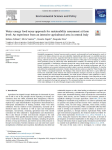Fabiani S., Vanino S. (2020). Water energy food nexus approach for sustainability assessment at farm level : an experience from an intensive agricultural area in central Italy. Environmental Science & Policy, 01/02/2020, vol. 104, p. 1-12.
https://doi.org/10.1016/j.envsci.2019.10.008
https://doi.org/10.1016/j.envsci.2019.10.008
| Titre : | Water energy food nexus approach for sustainability assessment at farm level : an experience from an intensive agricultural area in central Italy (2020) |
| Auteurs : | S. Fabiani ; S. Vanino ; R. Napoli ; P. Nino |
| Type de document : | Article |
| Dans : | Environmental Science & Policy (vol. 104, February 2020) |
| Article en page(s) : | p. 1-12 |
| Langues : | Anglais |
| Langues du résumé : | Anglais |
| Catégories : |
Catégories principales 06 - AGRICULTURE. FORÊTS. PÊCHES ; 6.4 - Production Agricole. Système de ProductionThésaurus IAMM DURABILITE ; EAU ; QUALITE DE L'EAU ; ENERGIE ; ALIMENTATION HUMAINE ; EVALUATION ; AGRICULTURE INTENSIVE ; EXPLOITATION AGRICOLE ; BLE DUR ; FERTILISATION ; GESTION DES RESSOURCES NATURELLES ; IMPACT SUR L'ENVIRONNEMENT ; ITALIE ; CENTRO |
| Résumé : | Sustainable management of natural resources under economic, environmental and social perspective, needs to consider a fair balance between its uses and availability. Sustainable agriculture goal is to establish innovative and new farm tools and service capacities that help the intensive farm sector to optimize input management (energy, nutrients and water) and productivity. The main objective of this paper was to investigate, in a durum wheat production system in central Italy under Mediterranean conditions, the following aspects: (i) environmental sustainability of fertilization treatments through the energy inputs/outputs analysis and reduction of Nitrate (N-NO3) in water cycle; (ii) agricultural system agronomic and economic performance and (iii) to identify regulatory and economic instruments actually in place to promote sustainable fertilization. To describe and address the sustainability assessment of durum wheat production system we adopt the “Water Energy Food nexus” (WEF) as conceptual framework. The findings of this research showed that there is a great difference between the marketable yields obtained with mineral fertilization strategies and those by organic fertilizer, while considering the environmental sustainability, our results provide evidences of the significance of the reduction of energy use and the high value of renewable energies and the decreasing of non-renewable one. At the same time the reduced impact of groundwater quality due to the organic fertilizer seems to be an interesting result to be analyzed in the long-term perspective. The contraposition between economy and environment is one of the main challenges to be solved through adequate policy instruments. |
| Cote : | Réservé lecteur CIHEAM |
| URL / DOI : | https://doi.org/10.1016/j.envsci.2019.10.008 |







